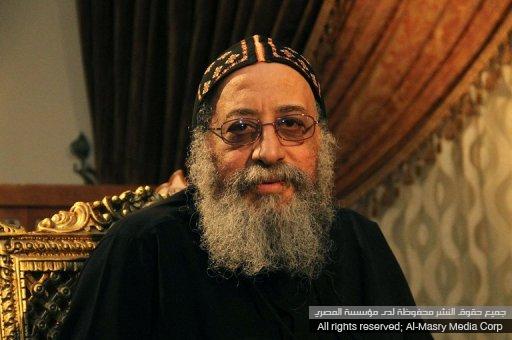 WADI AL-NATRUN — The new Coptic Orthodox pope said on Monday that a constitution being drafted by Egypt's politicians must be inclusive and the church would oppose any text that only addressed one part of the Muslim-majority nation.
WADI AL-NATRUN — The new Coptic Orthodox pope said on Monday that a constitution being drafted by Egypt's politicians must be inclusive and the church would oppose any text that only addressed one part of the Muslim-majority nation.
Pope Tawadros II, picked on Sunday in a ceremony steeped in the traditions of a church that predates Islam's arrival in Egypt, also told Reuters that Christians should be more active in seeking to shape Egypt's politics after last year's revolt.
The 60-year-old pope, the 118th to lead a church that traces its origins back to the early era of Christianity, has taken the helm when many Christians who make up about a tenth of the nation's 83 million people are alarmed by the rise of Islamists.
Christians had for decades felt shoved to the margins of society and politics. Yet, even though many joined the uprising to oust Hosni Mubarak, they now worry they will be pushed further aside by Islamists who the former president repressed.
"The beauty of Egyptian society is the presence of Muslims beside Christians. Diversity is strong and beautiful," the pope said in an interview at a desert monastery, where a day earlier he learned his name had been picked out of a glass bowl by a blindfolded boy in an elaborate ceremony at a Cairo cathedral.
Three names, selected in a vote, had been put in the bowl for choosing the man who would replace Pope Shenouda III, the figurehead for Egypt's Orthodox Christians for four decades.
Bearded, bespectacled and wearing the long black robes of a priest, the new pope said Egypt's diversity should be reflected in the constitution being drawn up by a 100-person assembly, which is dominated by Islamists but also includes Muslim and Christian religious leaders, liberals and other politicians.
"If a good constitution is presented in which every person finds himself [represented], there is no doubt Egypt will develop," said the pope, who trained in Egypt and the UK as a pharmacist before being ordained into the priesthood.
"But if the constitution addresses one part of the community and ignores another it will take society backwards," he said, speaking quietly and carefully in a room surrounded with pictures of his predecessor, whose death in March left many Christians feeling bereft after he had been in charge so long.
Adding context to his comments, the pope was speaking from Anba Beshoy monastery, one of several in Wadi al-Natrun, northwest of Cairo, that flourished as Christian desert retreats when Muslim conquerors from Arabia were expanding their influence across Egypt and North Africa.
No to politics
Asked what he would do if the constitution was too heavily loaded with Islamic references, the pope said: "We will make an objection." He did not specify what he would deem too Islamic and said he would not urge his flock onto the street in protest, a common call by Islamists and others since Mubarak's overthrow.
"The church does not play any political role at all," he said. "If religion and politics meet, they ruin each other."
The latest constitution drafts have more Islamic content than the Mubarak-era version, but one key article saying "the principles of sharia (Islamic law)" are the main source of legislation remains unchanged. Hardline Salafi Muslims, a vocal force in Egypt's new politics, are demanding stronger language.
Even though the church would not take political action, the pope said there were kindred voices among more liberal politicians and moderate Muslims who have also objected to what they say are Islamist efforts to dominate the drafting process.
Yet, the new church leader said it was time for Christians independently to play a bigger part in politics to secure their rights, as any citizen should, after years of retreating from the public arena and leaving the church to act as advocate.
Although Tawadros insisted he was continuing the work of Pope Shenouda III, his comments suggested a shift from his predecessor who was criticized by some Christians for becoming too politicized and aligning himself too closely to Mubarak.
"There is a development in the society, and encouraged by the church, that every citizen should on his own achieve his rights," he said, adding that post-revolutionary Egypt offered Christians a chance to express their demands more openly.
"I encourage my children to participate in parties and express their opinions."
President Mohamed Morsy, propelled to power by the Muslim Brotherhood, has vowed to protect the rights of Christians and others. But this has not dispelled the fears of many Christians who have long complained of discrimination in the workplace and other areas of society.
Without referring to individuals, the pope said he welcomed promises by Islamist politicians but wanted "something on the ground." He pointed to issues such as the longstanding demand of Christians to make it as easy to build a church as a mosque.
But he said he was optimistic for the biggest Christian community in the Middle East, saying Christians would not be deterred by adversity. "The Christian person is like a palm tree — when you throw a stone at it, it drops its dates," he said.



